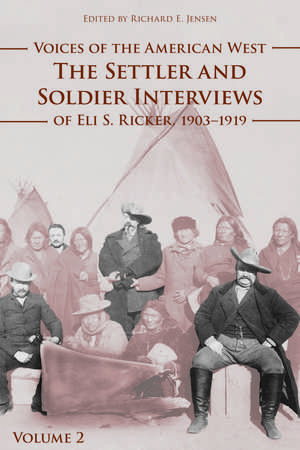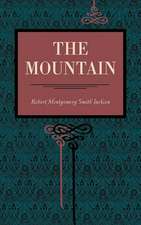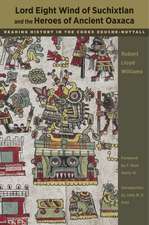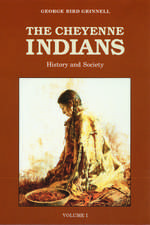Voices of the American West, Volume 2: The Settler and Soldier Interviews of Eli S. Ricker, 1903-1919
Autor Eli S. Ricker Editat de Richard E. Jensenen Limba Engleză Paperback – 31 mai 2012
In this second volume of interviews conducted by Nebraska judge Eli S. Ricker, he focuses on white eyewitnesses and participants in the occupying and settling of the American West in the nineteenth century.
In the first decade of the twentieth century, as the Old West became increasingly distant and romanticized in popular consciousness, Eli S. Ricker (1842–1926) began interviewing those who had experienced it firsthand, hoping to write a multivolume series about its last days, centering on the conflicts between Natives and outsiders. For years Ricker traveled across the northern Plains, gathering information on and off reservations, in winter and in summer. Judge Ricker never wrote his book, but his interviews are priceless sources of information about that time and place, and they offer more balanced perspectives on events than were accepted at the time.
Richard E. Jensen brings together all of Ricker’s interviews with those men and women who came to the American West from elsewhere—settlers, homesteaders, and veterans. These interviews shed light on such key events as the massacre at Wounded Knee, the Little Bighorn battle, Beecher Island, Lightning Creek, the Mormon cow incident, and the Washita massacre. Also of interest are glimpses of everyday life at different agencies, including Pine Ridge, Yellow Medicine, and Fort Sill School; brief though revealing memoirs; and snapshots of cattle drives, conflicts with Natives, and the construction of the Union Pacific Railroad.
| Toate formatele și edițiile | Preț | Express |
|---|---|---|
| Paperback (1) | 212.04 lei 3-5 săpt. | |
| BISON BOOKS – 31 mai 2012 | 212.04 lei 3-5 săpt. | |
| Hardback (1) | 324.66 lei 3-5 săpt. | |
| Nebraska – 30 noi 2005 | 324.66 lei 3-5 săpt. |
Preț: 212.04 lei
Nou
Puncte Express: 318
Preț estimativ în valută:
40.58€ • 42.21$ • 33.50£
40.58€ • 42.21$ • 33.50£
Carte disponibilă
Livrare economică 24 martie-07 aprilie
Preluare comenzi: 021 569.72.76
Specificații
ISBN-13: 9780803239975
ISBN-10: 0803239971
Pagini: 498
Ilustrații: 10 illustrations, 1 map, 1 appendix
Dimensiuni: 152 x 229 x 35 mm
Greutate: 0.73 kg
Editura: BISON BOOKS
Colecția Bison Books
Locul publicării:United States
ISBN-10: 0803239971
Pagini: 498
Ilustrații: 10 illustrations, 1 map, 1 appendix
Dimensiuni: 152 x 229 x 35 mm
Greutate: 0.73 kg
Editura: BISON BOOKS
Colecția Bison Books
Locul publicării:United States
Notă biografică
Richard E. Jensen is retired from the Nebraska State Historical Society, where he was senior research anthropologist. His most recent books are The Pawnee Mission Letters, 1834–1851 and Eyewitness at Wounded Knee, both available from the University of Nebraska Press.
Cuprins
List of Illustrations
Introduction
Map: The West of Eli S. Ricker
Chapter One: Wounded Knee
1. Peter McFarland. Wounded Knee
2. Charles W. Allen. Wounded Knee
3. Meded Swigert. Wounded Knee
4. Guy Vaughn. Wounded Knee
5. Francis M. J. Craft. Wounded Knee
6. John W. Butler. Wounded Knee
7. James R. Walker. Wounded Knee
8. George E. Bartlett. Biography, Wounded Knee
9. George A. Stannard. Wounded Knee
10. Joseph Kocer. Wounded Knee
11. W. F. Clark. Wounded Knee
12. E. C. Swigert. Wounded Knee
13. W. A. Birdsall. Wounded Knee
14. Cornelius A. Craven. Wounded Knee
15. James White. Wounded Knee
16. John H. Dixon. Wounded Knee
17. T. L. Williams. Wounded Knee
18. W. A. Ballou. Wounded Knee
19. Elbert Mead. Wounded Knee
20. Eli S. Ricker. Wounded Knee
Chapter Two: Agents and Agencies
1. Mr. and Mrs. E. M. Keith. Wounded Knee, Pine Ridge agents
2. Robert O. Pugh. Pine Ridge agents, Ghost Dance, Sioux Customs
3. H. A. Mossman. Pine Ridge agents
4. A. F. Johnson. Pine Ridge missions
5. William J. Cleveland. Sioux missions
6. Edmund Thickstun. Sioux customs, Indian-white relations
7. John R. Brennan. Pine Ridge reservation
8. George Stover. Biography, Franck Grouard, Pine Ridge Reservation, Pine Ridge agents
9. John B. Sanborn. Sioux reservation boundaries
10. Ollufine Nelson. Yellow Medicine Agency
11. Peter B. Nelson. American Horse, Yellow Medicine Agency
12. Mabel M. Dawson. Fort Sill Indian School, Geronimo
Chapter Three: Little Bighorn
1. A. F. Ward. Little Bighorn
2. Charles Clifford. Little Bighorn, Yellow Horse's account
3. Edward H. Allison. Little Bighorn, Lieutenant Harrington's death, Gall
4. Edward S. Godfrey. Little Bighorn
5. F. E. Server. Little Bighorn, Frank Grouard, Lame Deer fight, Crow agencies, Jim Bridger
6. Walter Q. Tucker. Little Bighorn
7. Archie Smith. Little Bighorn
Chapter Four: Beecher Island
1. Allison J. Pliley. Beecher Island fight
2. John J. Donovan. Beecher Island fight
3. Beecher Island Veterans. Beecher Island fight
Chapter Five: Lightning Creek Incident
1. Eli S. Ricker. Lightning Creek incident
2. Hugh Houghton. Lightning Creek incident
3. Roy Lemons. Lightning Creek incident
4. Isaac Robbins. Lightning Creek incident
Chapter Six: Biographical Sketches
1. W. R. Jones. Connor, Bissonette, Little Big Man, Crook, Sechler, Salaway, Little Bat, Pine Ridge Agency, Fort Mitchell, Red Cloud
2. L. B. Lessert. Fort Casper, the Bakers, Bridger, Yellow Medicine Agency, Pine Ridge agents, Beckwourth
3. Alexander Baxter. Scouts and interpreters, agents, Indian leaders, 1868 Fort Laramie treaty
4. Harry Dean. Wild Bill Hickok
5. John W. Brafford William F. Drannan
6. Marion Spencer. Bridger and Vasquez
Chapter Seven: The Old West
1. Magloire Mousseau. American Fur Company, Ash Hollow fight, Fort Casper, Fort Laramie, Kelly, Larimer, and Wakefield, scouts, traders, officers, and agents
2. George W. Colhoff. Galvanized Yankees, treaties and reservations, the Richards, Frank Grouard, Bridger, Little Bat, Pine Ridge agents, Red Cloud
3. Carter P. Johnson. Cheyenne outbreak, Sidney-Deadwood stagecoach robberies, Apache Kid
4. Baptiste Pourier. Biography, the Richards, Bozeman Trail forts, Rosebud fight, Slim Buttes fight, Crazy Horse, Sibley Scout
5. Richard C. Stirk. Flagpole at Red Cloud Agency, Slim Buttes fight, Wounded Knee
6. Ben Tibbitts. Washita fight, Flagpole at Red Cloud Agency, Wounded Knee
7. Heber M. Creel. Cheyenne outbreak
8. William L. Judkins. Mackenzie-Dull Knife fight
9. David Y. Mears. Sibley Scout, Cheyenne outbreak
10. Jacob A. Augur. Cheyenne outbreak
11. A. G. Shaw. Eleventh Ohio Cavalry, Platte Bridge fight, Rush Creek fight, Horse Creek fight, Custer's dead, Spotted Tail, Crazy Horse
12. Peter Abraham Deon. American Fur Company, Father DeSmet, Horse Creek treaty, Red Cloud
13. John Russell. The Richards, Kelly, Larimer, and Wakefield, scouts, traders and officers, Wounded Knee
14. Augustus W. Corliss. Biography, Wounded Knee, officers and Indians
15. John C. Whalen. Powder River campaign, Platte Bridge fight, Wounded Knee
16. John W. Irion. Rawhide Creek legend, Masonry and Indians, Sand Creek
17. A. W. Means. Sand Creek
18. John M. Comegys. Scouts and officers
19. William H. Taylor. Crook's 1876 campaign
20. Mr. and Mrs. William H. Robertson. Grattan fight
21. Allison J. Pliley. Prairie Dog Creek fight
22. William Holdaway. U.P. Railroad construction
23. John Burdick. Custer
24. William A. Coffield. Telegraph at Fort Robinson
25. James H. Cook. William F. Cody, The Texas Trail
26. Donald Brown. Warbonnet fight, Slim Buttes fight
27. Winfield S. Ake. Camp Lyon, Paiutes
28. Joseph Bingaman. Washita fight
29. George A. Leclere. Whitestone Hill fight, Badlands campaign
30. Mr. and Mrs. John Farnham. Red Cloud
31. Charles J. Brown. Treaties with the Sissetons, Wahpetons, Medewakantons, and Wapecootahs
Appendix A: Forts
Notes
Bibliography
Index
Recenzii
“A magnificent achievement to the oral-history sources available on the American West. This collection of Ricker’s interviews provides a rich resource on the Old West for the scholar and those interested in an accurate analysis of the lives of Indians, soldiers and settlers. . . . The strength of the volumes is in the stories told by the interviewees, with their perspectives on key historical events from the Old West, which is equally suited to the student and the academic scholar.”—American Studies
“The interviews are a gold mine of information, and researchers will be rewarded for digging through them. Jensen has helped a great deal by organizing the book into three main chapters subdivided by respondent and topic. . . . Ricker left Nebraska and the West an important source of information, and Jensen has made this more user-friendly by his organization and commentary.”—Great Plains Quarterly
“Amazing personal accounts [are] in these volumes, which present for the first time the extensive turn-of-the-century interviews of Eli S. Ricker, a pioneering Nebraska judge and newspaperman who traveled across the Dakotas a hundred years ago, interviewing the last of the old-timers on the northern prairie. . . . Here are the authentic voices of the real people who were actually there at Beecher’s Island, Little Bighorn, and Wounded Knee. Here is western history at its finest--vivid oral narratives that very well may become the stuff of prize-winning stories, novels, and films.”—Bloomsbury Review
“Ricker proved himself a patient and meticulous oral interviewer, giving voice to people mostly ignored by historians of his day. His subjects document the Ghost Dance as a genuine religious movement, not as a ‘craze’ as described in white accounts. . . . Editor Richard Jensen provides a true service, for having translated Ricker’s arcane handwritten notes into readable form and for his endnotes filled with biographical information.”—James N. Leiker, Kansas History
“Priceless sources of information that offer more balanced perspectives on events than were accepted at the time. . . . There is no doubt that the voices and stories captured here in both books will be of significant value.”—Lincoln Journal Star
"Anyone wishing to know more about Wounded Knee, the Little Bighorn, the history of the western frontier in general, and many other topics will certainly want to refer to Jensen's work."—Rick Ewig, North Dakota History
"Another brilliant offering."—David Woodbury, of Battlefields and Bibliophiles
"This is an important collection, well edited, and a must for anyone wanting to get an insider's view of life east of the Rockies between the 1840s and 1900."—Alan Culpin, Westerners Bookshelf

















